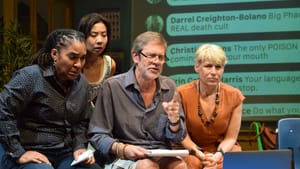Stay in the Loop
BSR publishes on a weekly schedule, with an email newsletter every Wednesday and Thursday morning. There’s no paywall, and subscribing is always free.
The problem with consensus
InterAct Theatre Company presents Jonathan Spector’s ‘Eureka Day’

Eureka Day, now onstage at InterAct, immediately intrigued me because it’s by Bay-Area playwright Jonathan Spector, who sets the action in Berkeley, California. I spent a formative eight years of my life in San Francisco, and almost anything from that region will immediately pique my interest and homesick heart.
The trouble with everyone’s opinion
The play examines the decision-making process of a board of parent-directors following a mumps outbreak at a private school called Eureka Day. Some students’ parents, including some on the board, are anti-vaxxers unwilling to adhere to a new request that all students undergo standard vaccinations before resuming attendance at the school. Chaos ensues as it becomes apparent that not everyone in this conscious community has the same definition of social justice. The school board must confront one of the most relevant and significant questions facing society today: how do you find consensus when you can’t agree on the facts?
All decisions at Eureka Day School in Berkeley are made by consensus, and diversity of opinion is valued. Three white parents (Leonard C. Haas, Dan Hodge, and Catharine K. Slusar), one Black parent (Alexandra Espinoza), and one Asian parent (Bi Jean Ngo) make up the board. The play accurately captures the nuances of representation and the awkwardness that rises to the surface when liberals are called out for their prejudices.
The progressive bubble
An all-too-real scene hit home for me, depicting how some white liberals claim to support inclusion, yet their inclusion of diverse voices involves silencing or talking over marginalized people. I have personally experienced several instances discussing topics of diversity, immigration, or racism with my liberal, white “allies” where I can’t get a word in. These “progressive” people are so eager to talk about how unjust the circumstances are for others that my own first-hand experiences—as an actual brown person who’s the daughter of immigrants—are ignored. Chalk it up to white guilt or playing the role of white savior, but both can be frustrating as hell.
Transporting me back to the well-intentioned, progressive bubble that is the Bay Area, this play humorously lets liberals poke fun at other liberals. In many ways, this region is righteously proud of the policies and changes they’ve implemented to create a more inclusive community that cares about others and the planet. Spector clearly has an insider perspective on the triumphs and pitfalls of such a community. Eureka Day illuminates the latent racism that exists in even the most progressive communities.
When feelings outweigh facts
The first half of the play is dynamically comedic and filled with hilarious moments highlighting disagreements over parenting styles and what happens when good intentions go awry. But the show loses steam after intermission, rapidly shifting to more drama-laden but less captivating scenes. A half-hour could be shaved from the two-hour run time, as the play drags on in the final act, with scenes sometimes feeling like a lecture. Although Eureka Day hinges on the debate swirling around vaccinations, I craved more breaks from the issue in the script.
The play offers some surprising revelations highlighting how dangerous emotionally charged beliefs can be, displaying how people can be so invested in their emotions that they are incapable of accepting facts or reason. Scenes between Slusar’s Suzanne and Espinoza’s Carina (two of the parents on the board) are particularly ripe with micro-aggressions and thinly veiled insults. The actors build tension patiently, only to have the release pay off in a burst of confrontational truth and honesty.
Director Seth Rozin succeeds in evoking visceral reactions from the audience, particularly from parents in the audience who howled with laughter throughout the play, clearly relating deeply to the subject matter. Eureka Day is a timely comedy that develops into a prudent lesson reminding us that there will always be lines of division, even within the most thoughtful and intentional of communities.
What, When, Where
Eureka Day. By Jonathan Spector, directed by Seth Rozin. Through November 17, 2019, at InterAct Theatre Company, 302 South Hicks Street, Philadelphia. (215) 568-8079 or interacttheatre.org.
The Drake Theatre complex is fully accessible, though wheelchair users will need assistance with the heavy front doors. Wheelchair seating, companion seating, and mobility and audiovisual-accessible seating is available for all performances. Seating requests can be made prior to the performance by calling (215) 568-8079 or emailing [email protected]. The Drake has gender-neutral restrooms.
Sign up for our newsletter
All of the week's new articles, all in one place. Sign up for the free weekly BSR newsletters, and don't miss a conversation.

 Christina Anthony
Christina Anthony